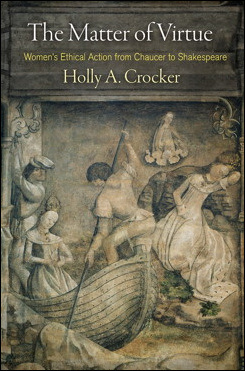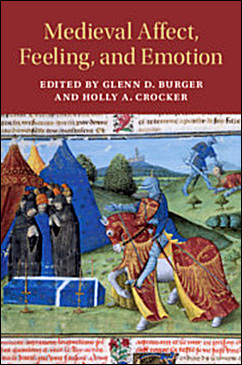Department of English Language and Literature
Directory
Holly Crocker
| Title: | Carolina Distinguished Professor |
| Department: | English Language and Literature College of Arts and Sciences |
| Email: | hcrocker@mailbox.sc.edu |
| Phone: | 803-576-5962 |
| Office: | HUO, Room 317 |
| Resources: | English Language and Literature |

Education
PhD, Vanderbilt University, 1999
MPhil, University of Wales, 1998
Specialization
• Medieval and Reformation Literatures and Cultures
• Feminist Theory
• Affect Theory
• Posthumanism
Courses
ENGL 401 Chaucer the Poet
ENGL 402 Tudor Literature
ENGL 406 Shakespeare's Comedies and Histories
ENGL 419N Medieval Masculinities
ENGL 437 Women Writers
SCHC 452J Honors Seminar: Sovereigns, Tyrants, and Shrews in Early English Literature
WGST 701 Feminist Theory Now
ENGL 705 Chaucer's Men
ENGL 705 The Soul of Chaucer
ENGL 708 Envisioning the Self in Late Medieval Literature
Activities
I am author of Chaucer’s Visions of Manhood (Palgrave, 2007), co-editor of Medieval Literature: Criticism and Debates (Routledge, 2014; with D. Vance Smith), and editor of Comic Provocations: Exposing the Corpus of Old French Fabliaux (Palgrave, 2006). My articles have appeared in The Chaucer Review, Exemplaria, The Journal of Early Modern Cultural Studies, The Journal of Medieval and Early Modern Studies, Medieval Feminist Forum, New Medieval Literatures, Shakespeare Quarterly, Studies in the Age of Chaucer, Studies in English Literature, 1500-1900, and numerous edited collections. I am also co-editor of a special issue of postmedieval: a journal of medieval cultural studies on “Premodern Flesh” 4.4 (2013; with Kathryn Schwarz).
From 2008-2015 I was forum editor and reviews editor of postmedieval: a journal of medieval cultural studies. I have been a member of the MLA’s Chaucer Division Executive Committee (2010-15; Chair, 2014), a member of the New Chaucer Society Program Committee (Portland, 2012), and Co-Chair of the New Chaucer Society Program Committee (Reykjavik, 2014; with Glenn Burger). My work has been supported by fellowships from the Fulbright Commission, the NEH, the Folger Shakespeare Library, IASH at Edinburgh University, and the Forschungskolleg Humanwissenschaften at the Goethe University of Frankfurt. I am the recipient of the departmental teaching award, as well as the Graduate English Association’s award for best performance in the classroom. I have also twice won the William Richey Faculty Mentor Award from the Graduate English Association. In 2014-2015 I held the English Department’s Morrison Professorship and was a Visiting Research Scholar at Vanderbilt University. In 2016, I won the Russell Research Award for Humanities and Social Sciences, the highest award for research at USC.
 |
I’ve just published a monograph, The Matter of Virtue: Women’s Ethical Action from Chaucer to Shakespeare (University of Pennsylvania Press, 2019: http://www.upenn.edu/pennpress/book/16018.html).
This project argues that English poets--including Bokenham, Capgrave, Chaucer, Fletcher, Henryson, Lodge, Lydgate, Shakespeare, and Spenser--elaborate a positive account of women’s ethical action. They do so through a poetic reformulation of virtue as material, animate, and performative. Rather than confine women within rigid prescriptive schema, writings under consideration in this study articulate a material conception of virtue that allows women to show strength, dignity, beauty, and constancy, among other qualities. By treating feminine virtues as embodied powers that exert material influence, these poets not only create powerful female characters, they also foster an ethics based on forbearance and endurance rather than governance and domination. |
|
Together with Glenn Burger, I’ve also recently published an edited volume, Medieval Affect, Feeling, and Emotion (Cambridge University Press, 2019: https://doi.org/10.1017/9781108672474).
This essay collection rethinks how feelings are represented in late Middle English literature (ca. 1375-1501). Across eight chapters and an afterword, it shows that the history of emotions and affect theory are similarly insufficient for investigating the intersection of body and mind featured in late Middle English literatures. And, while medieval studies has generated a rich scholarly literature on “affective piety,” essays in this collection chart an exciting new investigation of feelings in non-religious contexts. From Geoffrey Chaucer to Gavin Douglas, and from practices of witnessing to the adoration of objects: essays in this volume chart the coexistence of emotion and affect in late medieval representations of feeling. |
 |
I’m currently finishing a new monograph, The Feminist Subject of Late Medieval Literature, which offers a positive account of feminist subjectivity in Chaucer, Langland, the Pearl-poet, Hoccleve, and Kempe. I am editing an essay cluster for Studies in the Age of Chaucer on “Reconsidering the Subject,” and co-editing (with Carissa Harris) an essay cluster on “Theorizing Gender, Patriarchy, and Liberation: Imani Perry’s Vexy Thing and Medieval Studies,” for Exemplaria. Recent and forthcoming articles appear in PMLA and Ethics in the Arthurian Legend (ed. Melissa Ridley Elmes and Evelyn Meyer). I also write on the relationship between past and present for the ARCADE project at Stanford: http://arcade.stanford.edu/users/holly-crocker. You can find links to my work, including my current and developing projects, at my website: https://hollyacrocker.com.